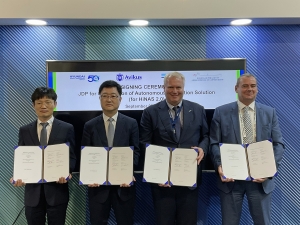


(Posted on 09/09/22)
DNV has signed a memorandum of understanding (MOU) with maritime industry technology leaders HHI, AVIKUS and Liberian International Ship & Corporate Registry (LISCR) to collaborate on autonomous ship technology developments.
The Hyundai intelligent Navigation Assistant System (HiNAS 2.0) is an AI-based navigation solution that covers all steps for voyage from detection to situation analysis, planning and control. The system assists in safe navigation by displaying AR (augmented reality) images of detected ships and navigation information. Furthermore, it controls heading and speed for collision avoidance and route tracking. Developed by AVIKUS, a subsidiary of Hyundai Heavy Industries (HHI), the system creates and controls optimal routes for collision avoidance in the ocean, aiming to reduce crew fatigue and increase fuel efficiency.
The multilateral MOU includes a joint study to deploy autonomous navigation systems on board ships to increase technology uptake by the industry and flag states. During the project, AVIKUS, HHI and LISCR will actively contribute to developing autonomous maritime solutions that comply with DNV Rules on autonomous operations, where AVIKUS aims to obtain an Approval in Principle from DNV as well as the Liberian Flag Administration.
“Through this cooperation, we believe that we will gain momentum to move forward to the next stage of autonomous ship technology. We will try to maintain the leading position in this technology and to increase competitiveness in the future ship market,” said Won Ho Joo, CTO of HHI.
“This joint development is meaningful in that it includes shipyards, autonomous solution companies, classification, and flag states to commercialize autonomous navigation solutions. Based on the results of this project, we will successfully commercialize HiNAS 2.0 and contribute to the improvement of navigation safety and fuel savings,” said Dohyeong Lim, CEO of AVIKUS.
“As a result of the 4th Industrial Revolution, the fast-paced technology development will pave the way for autonomous shipping. This ground-breaking MOU with collaboration between forward-thinking and safety-focused stakeholders will set an example of how artificial intelligence can support and enhance the safety of navigation and reduce GHG emissions,” said Thomas Klenum, Executive Vice President, Innovation and Regulatory Affairs at LISCR.
“Rightly applied, a higher degree of digitalization can contribute to safety and efficiency enhancements in shipping. Therefore, we are pleased to collaborate with industry technology leaders and help to advance the development of autonomous ships,” said Vidar Dolonen, Regional Manager DNV Maritime Korea & Japan.
AtoB@C Shipping, a subsidiary of ESL Shipping, has announced the successful delivery of Fleximar, the... Read more
Western Bulk, together with reputable Norwegian partners A/S J. Ludwig Mowinckels Rederi, Premium Maritime... Read more
Pacific Basin Shipping Limited, one of the world’s leading dry bulk shipping companies, has announced... Read more
Columbia Group anticipates a period of strong expansion as an increasing number of international shipowners... Read more
Norse?Ship Management has expanded its use of Smart Ship Hub’s high frequency sensor data and... Read more
As the maritime industry gears up to welcome the IMO’s STCW bullying and harassment training amendments... Read more
NORDEN has acquired the cargo activities of Taylor Maritime in Southern Africa (previously operated... Read more
Philippos Ioulianou, Managing Director of EmissionLink, has warned the IMO’s decision to delay... Read more
VIKAND has highlighted the need for cultural change in the maritime sector as reports of bullying, harassment... Read more
The maritime industry is experiencing a period of significant transformation, driven by rapidly evolving... Read more